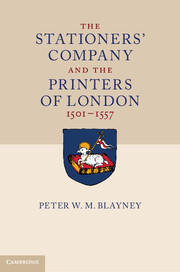Book contents
- Frontmatter
- Dedication
- Contents
- List of illustrations
- Preface
- Acknowledgements
- Permissions
- Conventions
- List of abbreviations
- 1 1357–1500
- 2 1501–1509
- 3 1510–1520
- 4 1521–1528
- 5 1529–1534
- 6 1535–1541
- 7 1535–1541
- 8 1542–1546
- Endnotes to Volume I
- 9 1547–1553
- 10 1553–1557
- 11 1554–1557
- 12 1501–1557
- APPENDIXES
- Bibliography
- Index of STC numbers
- General index
9 - 1547–1553
The reign of Edward VI
Published online by Cambridge University Press: 05 November 2014
- Frontmatter
- Dedication
- Contents
- List of illustrations
- Preface
- Acknowledgements
- Permissions
- Conventions
- List of abbreviations
- 1 1357–1500
- 2 1501–1509
- 3 1510–1520
- 4 1521–1528
- 5 1529–1534
- 6 1535–1541
- 7 1535–1541
- 8 1542–1546
- Endnotes to Volume I
- 9 1547–1553
- 10 1553–1557
- 11 1554–1557
- 12 1501–1557
- APPENDIXES
- Bibliography
- Index of STC numbers
- General index
Summary
The short-lived ‘freedom’ of the press
Edward VI was not yet nine and a half when he succeeded his father as king on 28 January 1547. Henry's will provided that his sixteen executors should govern as equal members of a council of regency until Edward turned eighteen. But within days the two men who had been Henry's chief advisers during his final years – Edward Seymour, earl of Hertford, and Sir William Paget – had persuaded their fellow executors that Seymour, as the new king's uncle, should be appointed lord protector. Elevated to duke of Somerset in February, by the middle of March Seymour had effectively been granted the right to wield all the royal power until Edward could reclaim it in 1555.
Henry's steadfast resistance to doctrinal change had allowed even his most conservative bishops to cooperate with his transformation of the English church, and to see his innovations as essentially political. But all the tutors Henry appointed to educate the prince were reform-minded humanists, and the leading men in the council of regency were in varying degrees Protestant. When choosing those executors he deliberately left out the most able and dangerous of his conservative councillors, Stephen Gardiner, bishop of Winchester. And a few weeks before Henry died, the conservative faction lost its most powerful secular pillar when the duke of Norfolk was attainted for concealing his son's treason. Somerset and the new council therefore found themselves ideally placed to begin a radical reformation of the English religion.
- Type
- Chapter
- Information
- The Stationers' Company and the Printers of London, 1501–1557 , pp. 601 - 745Publisher: Cambridge University PressPrint publication year: 2013



